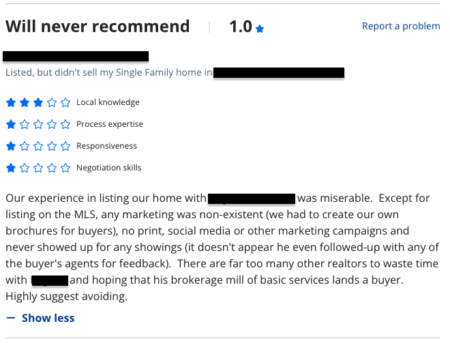Are you receiving Inman’s Agent Edge? Make sure you’re subscribed here.
Jay Thompson is a former brokerage owner who spent over six years working for Zillow Group. He’s also the co-founder of AgentLoop. He “selectively retired” in August 2018 but can’t seem to leave the real estate industry behind. His weekly Inman column is published every Wednesday.
Back in the day, I spent hundreds of hours talking to thousands of agents about reviews. How to get them, what to do with them and what not to do with them. In virtually every single conversation, this question came up: what happens if I get a negative review?
Understandably, people fear getting a negative review. Let’s face it, you have a tough job managing a complicated process. There are dozens of things that can send a transaction spinning out of control over which you have absolutely no influence. You are the client’s key contact and an easy target for finger-pointing when things go wrong, making it a virtual certainty that at some point you’ll be the recipient of a negative review.
Fear not, however. A negative review isn’t the end of the world. There are studies that have shown consumers put more trust in a service’s reviews if they aren’t all five stars. After all, no one is perfect, and a suboptimal review can actually add legitimacy to all those amazing reviews you have.
That’s not to say you should go out there seeking a subpar review. Just don’t freak out if you get one.
But what should you do if you get a negative review?
Simply put, deal with it. The best way to flip a negative review requires two steps: Make personal contact with the reviewer and publicly respond to the review. Let’s take a deeper look at each step.
The basics
Whether you are making personal contact or replying publicly to a review, there are some basic principles to observe.
- Don’t be defensive. Your goal is to understand the problem and what it will take to fix it, not point blame somewhere else.
- Own it. If you made a mistake, own it. If the reviewer made a mistake, help them understand without belittling them.
- Be empathetic. We’ve all had a bad experience as a consumer. You understand better than anyone how emotional the home buying or selling process can be. Showing understanding and empathy will go a long way in resolving any issues.
- Don’t take it personally. This is hard because you take pride in your work. It may feel quite personal, but the reviewer has a problem (or a perceived problem) with the transaction, not you personally.
- Be professional. Now is not the time to let your own emotions get the best of you. Don’t shout, don’t name-call. Be the professional you are, no matter what the reviewer may be flinging your way.
Make personal contact
The best way to deal with an upset client is to reach out to them personally. Ideally you should pick up the phone and call them. Now is not the time to depersonalize with a text or email.
Those, however, are better than ignoring the reviewer or initiating contact with a public response to their review. Your aim in this outreach is understanding their concerns and what might be done to address them.
Public response
Most review platforms provide a way for you to publicly respond to a review. Since complete strangers will be reading these, and, yes, judging your services, you need to respond to every negative review. (Ideally you should respond to all reviews. It’s an additional opportunity to present you, your message and your brand to the public.)
Observe the basic tenets listed above. Remember, the internet never forgets, and this is not where you want to memorialize going off on someone or acting unprofessionally.
What if …
You don’t know the reviewer?
Most sites allow anonymous reviews or utilize a user-created screen name that you may know to be able to connect with a person. If that’s the case, say so. Obviously you can’t reach out personally to an anonymous review, but you should reply publicly. A simple, “We cannot connect this review with any individual. Please reach out to us at (phone) or (email) as we would like to address your concerns directly.
This shows readers that you’re willing to take ownership and correct issues — both very positive aspects.
You’re being blamed for something out of your control?
As previously mentioned, real estate agents can be blamed for things completely out of their control. Inspections gone awry, lenders backing off a loan, clouded titles — it’s almost endless. If you find yourself in this situation, do not take the “you’re an idiot for getting a new credit card during your mortgage processing” route. Instead, use it as an opportunity to educate both the reviewer and the public.
You think the review is fake?
Yes, fake reviews exist. However, most major review systems have processes, procedures and checks built in to greatly reduce them. “This is fake!” could be true, but many (most?) who read a response like that think, “Yeah, of course that’s what you think.” Or, “they’re just taking the easy way out.”
You can probably report a review that you feel is fake, but be prepared to hear “the review stands.” Treat a “fake” review like any other and reply “we cannot associate this review with any client. Please contact us directly.” The high road is the right road; take it. The view is better and it’s less crowded.
Real-life examples
Seeing real life examples, good and bad, in action are worth a thousand words. Here are some published examples of good and bad responses to reviews.
The bad:

You know what’s wrong, really wrong, with this response? There is no response! How anyone would just let this be published to the world without responding is beyond me. Even if you disagree with everything the reviewer said, even if you think it’s “fake,” you have to respond.
To many consumers, no response makes it either appear like this happens regularly or that you just don’t care what people say about your business. Neither of those are thoughts you want people walking away with.
Here are actual responses left to reviews:

Your profile wasn’t hacked. If it was, then what makes your other 43 positive reviews genuine? Obviously fake? Which part? All of it (there were some positive points in the review)? Don’t blame either the reviewer or the “hackers.”
Instead, go with “As you can see from all our positive reviews, we take pride in doing our job well. We’ve researched what was presented in this review and cannot find any connection to an actual client. Would love for the reviewer to reach out to us directly, or respond to the review, so we can address any issues they may have had.”

A response like this, while it may well reflect your feelings, does nothing for anyone reading through your reviews. Stay professional and on that high road.
The good:

Doug does an outstanding job here of “owning it.” When I read this, my first thought was, “this guy has a lot of integrity, and he’ll admit when he’s wrong.” You know what I, and many others, want in an agent? Integrity.

Another great job of owning it. Telling the reviewer (and the world) that you’ll take feedback and do something with it is a very powerful message. Ending with sincere wishes for the reviewer is a class act on Doron’s part.
The excellent:

This isn’t a bad review at all. Peggy Lyn does a masterful job of highlighting what her team provides, as well as showing she’s willing to take constructive feedback and improve her process for all her future clients. A perfect example of how to reply to a review, and that you should reply to all reviews, not just the negative ones.
It’s perfectly normal to have concern over negative reviews. However, you shouldn’t fear them. Have a system in place to receive reviews, respond to all of them, and rather than fear reviews, enjoy the increased business they can bring.
Jay Thompson is a real estate veteran and co-founder of AgentLoop living in the Texas Coastal Bend. Follow him on Facebook, Instagram and Twitter. He holds an active Arizona broker’s license with eXp Realty. Called “the hardest working retiree ever,” as the founder of Jay.Life he writes, speaks and consults on all things real estate.













